African leaders visit NIH campus
Updated August 12, 2014; Originally published August 4, 2014
Visit by President of Mali, Vice President of Zambia
Thursday, August 7, 2014
A delegation of African leaders that included the President of Mali, Ibrahim Boubacar Keïta, and Zambian Vice President Guy Scott visited the NIH Clinical Center following the three-day U.S.-Africa Leaders Summit.
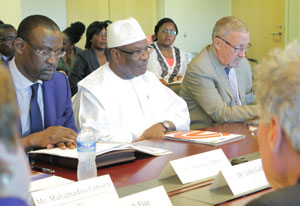
Photo by Bill Branson/NIH
President of Mali Ibrahim Boubacar Keïta (center)
and Zambian Vice President Guy Scott (right) visited
the NIH Clinical Center to discuss vaccinations, cancer
screenings, malaria and other key research and health
issues impacting their countires.
The visiting leaders were welcomed by NIH Director Dr. Francis S. Collins, along with several Institute and Center directors including Dr. Anthony Fauci, director of the National Institute of Allergy and Infectious Diseases (NIAID), Dr. John Gallin, director of the NIH Clinical Center, and Dr. Alan Guttmacher, director of the National Institute of Child Health and Human Development (NICHD).
Much of the discussion with the Zambia delegates centered on how to make HPV vaccinations more affordable, and how to progress from cervical cancer screening to better determining its causes. Dr. Collins mentioned Zambia's prominent role in implementing the Medical Education Partnership Initiative (MEPI) and emphasized the need to further efforts to "prevent the brain drain" among clinicians and researchers in Africa. The Institute and Center directors at the meeting also praised the Zambian government for encouraging women to get screened for cervical cancer and on its plans to begin treating HIV patients immediately upon diagnosis. "You're ahead of the curve," said Dr. Fauci.
Dr. Fauci spoke in detail about the many NIAID-supported research initiatives in Mali, including a malaria vaccine that will soon be tested there. "When we describe successes, one of the examples we often give is Mali," he said.
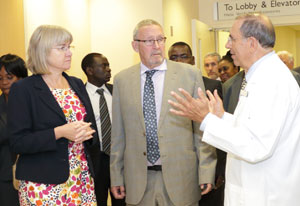
Photo by Bill Branson/NIH
Zambian Second Lady Charlotte Scott (left) and
Vice President Guy Scott (center), received a tour
of the Clinical Center from NIH Clinical Center
Director Dr. John Gallin.
President Keïta expressed appreciation for decades of research and training funded in his country, particularly in areas related to infectious diseases. "It's great, what NIH has done in terms of capacity building and fighting malaria," said Keita. "We are grateful for the work of your team in Mali, and in the rest of Africa." U.S. Ambassador Mary Beth Leonard echoed this sentiment, describing the NIH as "one of the things that makes me the proudest as an American in Mali."
Other global health challenges were discussed at the meeting, including tuberculosis, sickle cell disease, infant mortality and the current Ebola outbreak in West Africa. Though the Malian delegation had to depart immediately after the meeting, the Zambian vice president, second lady and other members of their delegation were given a tour of the Clinical Center by Dr. Gallin that included the NIH Children's School, the patient library and a metabolic studies unit where obesity research is conducted.
Visit by Presidents of Tanzania, Republic of the Congo, Kenyan cabinet secretary for health
Saturday, August 1, 2014
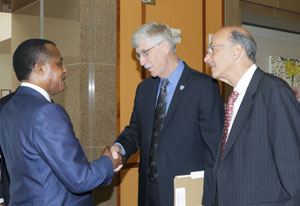
Photo by Bill Branson/NIH
NIH Director Dr. Francis Collins and Fogarty Director
Dr. Roger Glass greet President Denis Sassou
Nguesso, leader of the Republic of the Congo.
NIH Director Dr. Francis S. Collins welcomed a delegation of African leaders to the Bethesda campus on Saturday to discuss how to strengthen global health research collaborations to improve health, develop scientific capacity and spur economic development. The visitors included the presidents of Tanzania and the Republic of the Congo and Kenya's cabinet secretary for health.
NIH leaders joined the session to highlight NIH-supported initiatives in the three countries as well explore potential future collaborations on emerging health issues. Key NIH-supported partnerships in the region were showcased, including the Medical Education Partnership Initiative (MEPI) and the Human Heredity and Health in Africa Initiative (H3Africa). The delegation also toured the Clinical Center, visiting the chapel, a children's day hospital and a pediatric oncology unit.
"Of the 10 most rapidly growing economies, seven are in Africa. With economies growing, this seems like a great opportunity to talk about the potential to go even further in making investments in biomedical research," said Dr. Collins. "We are your partners in this regard."
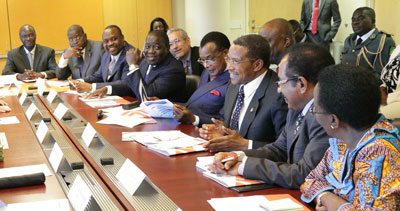
Photo by Bill Branson/NIH
James Macharia, Kenya's Cabinet Secretary for Health (seated, far left),
Republic of the Congo President Denis Sassou Nguesso (fifth from left)
and Tanzanian President Jakaya Kikwete (sixth from left) discuss
regional health concerns with NIH Institute and Center directors.
The meeting was held on the eve of the three-day U.S.-Africa Leaders Summit, the first such event of its kind and the largest meeting any U.S. President has held with African heads of state and government. The summit - which includes a signature event addressing global health concerns - will build on President Obama's trip to Africa in the summer of 2013, strengthening ties between the U.S. and African nations.
Tanzanian President Jakaya Kikwete discussed NIH's long relationship with Tanzanian research institutions, as well as pressing health concerns in his country including malaria, HIV/AIDS and the need to build capacity in areas related to noncommunicable diseases like cancer and diabetes. He expressed optimism, however, over ongoing malaria vaccine research and the significant drop in HIV rates. "We are one of the beneficiaries of this institution," said President Kikwete. "We're all thinking about the importance of research in my country, so these partnerships are crucial."
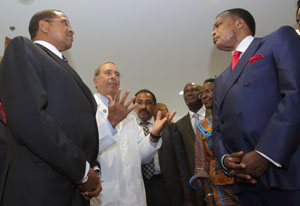
Photo by Bill Branson/NIH
Dr. John Gallin, director of the NIH Clinical Center,
took African leaders and delegates on a tour of
the hospital.
James Macharia, Kenya's Cabinet Secretary for Health, expressed similar concerns, describing a disease burden that includes malaria, TB and HIV/AIDS, as well as a growing threat from chronic diseases and a lack of personnel trained to cope with them. Challenges such as outdated and worn-out equipment, costs related to training oncologists and other specialists, and retaining physicians in country also hinder health intervention efforts, according to Macharia. NIH currently funds roughly 200 research and training collaborations in Kenya, including work on women's health, health and economics, tobacco use, capacity building, microbiomes, sexual health, mental health, cancer and numerous infectious diseases, with a strong focus on HIV/AIDS.
President Denis Sassou Nguesso and the NIH Institute and Center directors attending the meeting spoke about the current Ebola outbreak in West Africa and discussed research investments in the Republic of the Congo, where the NIH has a smaller portfolio. The president was briefed on NIAID-supported projects that address avian influenza, malaria and virus surveillance.
"Obviously, we are concerned about Ebola, and it is a grave situation with malaria and HIV as well," said President Nguesso. "We have a lot of challenges and need partners such as you."
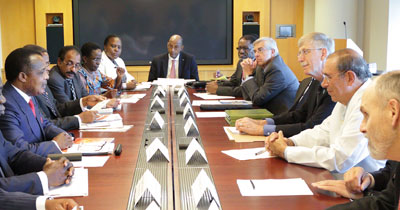
Photo by Bill Branson/NIH
Several NIH Institute and Center directors attended
the meeting.
Several NIH Institute and Center directors attended the meeting, including Dr. Anthony Fauci, director of the National Institute of Allergy and Infectious Diseases (NIAID), Dr. John Gallin, director of the NIH Clinical Center, Dr. Gary Gibbons, director of the National Heart, Lung, and Blood Institute (NHLBI), Dr. Roger Glass, director of the Fogarty International Center, Dr. Alan Guttmacher, director of the National Institute of Child Health and Human Development (NICHD) and Dr. Walter Koroshetz, deputy director of National Institute of Neurological Disorders and Stroke (NINDS).
NIH-Africa Research Partnerships
Learn more about successful NIH and Fogarty research and partnerships in Africa.
- Kenya
- Mali
- Tanzania
- Zambia
More Information
To view Adobe PDF files,
download current, free accessible plug-ins from Adobe's website.